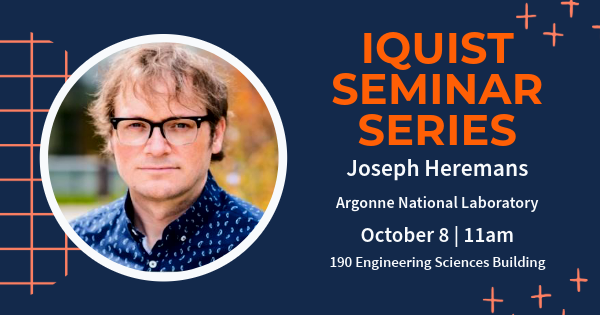
IQUIST Seminar: "Developing quantum technologies through materials design and integration," Joseph Heremans, Argonne National Laboratory
- Event Type
- Seminar/Symposium
- Sponsor
- IQUIST
- Location
- 190 Engineering Sciences Building, 1101 W Springfield Ave, Urbana, IL 61801
- Date
- Oct 8, 2024 11:00 - 11:50 am
- Speaker
- Joseph Heremans, Scientist, Argonne National Laboraotry
- Contact
- Stephanie Gilmore
- stephg1@illinois.edu
- Views
- 331
Developing quantum technologies through materials design and integration
Abstract: Optically addressable point-defects in wide band-gap semiconductors, such as the nitrogen-vacancy center in diamond, divacancy complexes in silicon carbide, and rare-earth defects in oxides, offer an array of versatile quantum systems for future quantum technologies. These isolated spin qubits offer numerous technological advantages including optical initialization and readout, along with microwave control of the ground state electron spin. These spin-qubit systems can be used in quantum applications ranging from quantum sensing to secure communication and networking. Here, I will present our work focused on developing novel materials platforms to address challenges associated with the scalability of quantum technology through materials design and integration. This will include our recent work on synthesizing ultrathin diamond membranes and direct bonding approaches for integration, local defect and host creation methods using ultra-fast lasers, as well as understanding and exploring defect systems in silicon carbide and novel oxide hosts. I will also describe some new fabrication processes and characterization techniques to better understand the fundamental limits of these novel quantum material platforms and help pave the way for defect-based quantum technologies.
Bio: I received my bachelor’s degree in Computer Engineering and Music Theory from the University of Michigan, and my Ph.D. in electrical engineering from the University of California, Santa Barbara, where I worked in the group of David Awschalom researching spin defects in wide-bandgap materials. I then joined the University of Chicago from 2013-2015 as a postdoc, and started my position as an assistant staff scientist at Argonne National Lab in 2016. I am currently a staff scientist at Argonne National Laboratory in the Center for Molecular Engineering and Materials Science Division, and a CASE Affiliated Scientist at the University of Chicago, Pritzker School of Molecular Engineering. I also serve as the Argonne Quantum Foundry lead, a Q-NEXT facility focused on full stack materials development of solid-state qubit systems.
For Zoom link you may check the IQUIST calendar weekly email or contact Stephanie Gilmore (stephg1@illinois.edu). To subscribe to our weekly email for event announcements, please go to https://lists.illinois.edu/lists/subscribe/iquist-announcements.